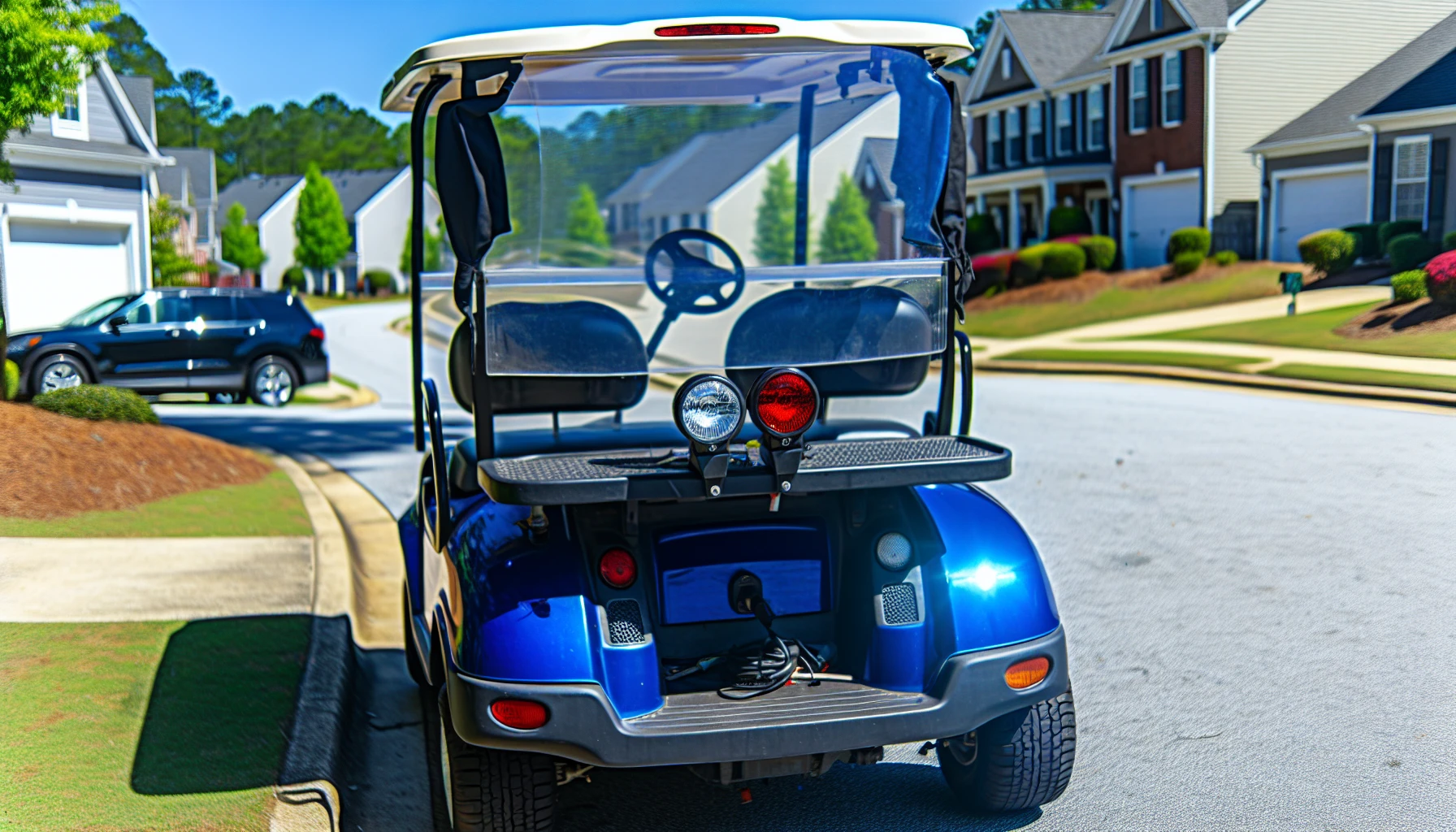Golf carts have become an increasingly popular mode of transportation in Georgia, offering a fun, eco-friendly alternative to traditional vehicles. As a golf cart enthusiast, it’s essential to understand the “golf carts rules of the road in Georgia” and the necessary requirements to ensure a safe and enjoyable experience. In this comprehensive guide, we will explore Georgia’s golf cart road rules, essential equipment, legal distinctions, safe operation practices, registration, insurance, and special case scenarios.
Key Takeaways
- Understand Georgia’s golf cart road rules for safe and responsible operation.
- Adhere to local laws, safety practices, and equipment requirements for street-legal use.
- Be aware of special permits, insurance regulations, and off-road designations when operating a golf cart in Georgia.
Understanding Georgia’s Golf Cart Road Rules
Georgia’s golf cart road rules are intended to promote safety and responsible use of these adaptable vehicles on public roads. These rules encompass various aspects from driving eligibility to speed regulations, all aimed at safeguarding the operators, passengers, and other road users. Familiarizing oneself with these rules is a necessary step for any golf cart driver, helping to prevent potential dangers and legal issues.
In Georgia, golf carts fall under the broader category of motorized vehicle, which are allowed to be driven on state streets, provided they meet specific requirements. However, bear in mind that these rules might differ based on local jurisdiction, hence it’s advisable to consult your local authorities for any extra regulations in your area, especially when it comes to Georgia golf cart usage.
Eligibility to Drive a Golf Cart
To operate a golf cart in Georgia:
- The driver must be at least 12 years old and not exceed the top speeds allowed.
- Drivers under 16 years of age must be supervised by a licensed adult who is at least 18 years old.
- If the driver is 15 years old and has a permit, they can operate the golf cart alone.
Ensuring that all drivers and passengers are aware of the eligibility requirements is key to preventing potential accidents and legal issues. Such knowledge helps promote a safe environment for all road users.
Roadway Guidelines for Golf Carts
Local authorities in Georgia have the power to authorize golf cart usage on public roads, subject to certain restrictions. For golf carts to be permitted on roads, local authorities must pass an ordinance specifying the conditions for their use.
Certain equipment regulations for motor vehicles, including the exclusive use of:
- Headlights
- Taillights
- Brake lights
- Turn signals
- A horn
must be adhered to when operating a golf cart on Georgia streets during the evening. Compliance with these guidelines guarantees that your golf cart remains street legal and safe for all road users.
Speed Regulations and Safety
Speed regulations are essential in maintaining the safety of both golf cart operators and other road users. In Georgia, the maximum permitted speed for golf carts is 20 miles per hour. Golf carts are also not allowed to be operated on roads with speed limits exceeding 35 mph.
It’s important to remember that Georgia’s DUI laws apply to golf carts as well. Therefore, driving under the influence in a golf cart with low speed vehicle laws is not only dangerous but also illegal. Adhering to speed regulations and other traffic laws is crucial for maintaining a safe environment for everyone on the road.
Essential Equipment for Street-Legal Golf Carts
To ensure the safety of golf cart operators, passengers, and other road users, specific equipment is required for street-legal golf carts in Georgia. From visibility and lighting requirements to audible warnings and control features low speed vehicles, these components play a crucial role in minimizing the risk of accidents and promoting responsible driving practices.
Golf carts equipped in accordance with the regulations not only boost safety but also ensure adherence to Georgia’s golf cart laws. Familiarity and compliance with these equipment requirements allow for confident operation of your golf cart on public roads, free from worries of legal repercussions.
Visibility and Lighting Requirements
Visibility and lighting requirements are essential for the safe operation of golf carts, especially during nighttime hours. In Georgia, golf carts must be equipped with certain safety features before they can be operated between sunrise and sunset. These safety features include:
- Headlights
- Brake lights
- Turn signals
- Windshield
These components are vital for ensuring that your motorized vehicle or golf cart is visible to other motorists and pedestrians, reducing the risk of collisions and accidents.
Regular checks on your golf cart’s lighting components to ascertain their correct functioning are important. This practice contributes to maintaining a safe environment on Georgia roads and encourages responsible golf cart usage.
Audible Warnings and Control Features
Audible warnings and control features play a significant role in promoting the safe operation of golf carts in Georgia. Golf carts must be equipped with:
- A horn or other audible signal when approaching pedestrians from behind
- Braking systems
- Reverse warning devices
- Tail lamps
- Hip restraints
The purpose of a reverse warning device is to emit an acoustic signal to the exterior of a vehicle while it is reversing, alerting pedestrians and other vehicles of the vehicle’s movement in reverse, thus enhancing safety level road surface and reducing the risk of accidents. By ensuring your golf cart motor vehicle is equipped with these essential control features, you can contribute to a safer driving environment for all road users.
The Legalities of LSVs Versus Golf Carts in Georgia
In Georgia, there is a distinction between low-speed vehicles (LSVs), golf carts, and personal transportation vehicles, with specific regulations for each type of vehicle. Understanding the differences between these three categories motor vehicles and their respective laws is crucial for operating your vehicle legally and safely on Georgia roads.
As a golf cart owner or operator, being aware of these distinctions and the associated legal requirements will help you make informed decisions regarding the use and maintenance of your vehicle. This knowledge will also ensure that you stay compliant with Georgia’s golf cart laws and avoid any potential legal issues.
Low Speed Vehicle Laws
Low-speed vehicle (LSV) laws in Georgia require drivers to be at least 16 years old, possess a valid driver’s license, register the vehicle, provide proof of insurance, and abide by all applicable traffic laws. LSVs must be equipped with safety equipment for the driver and passengers’ protection. This includes headlamps, stop lamps, turn signal lamps, taillamps, reflex reflectors, parking brakes, rearview mirrors, windshields, seat belts and vehicle identification numbers..
Compliance with these LSV laws ensures that your vehicle remains street legal and safe for all road users. Furthermore, comprehension and adherence to these regulations contribute to accident prevention and protection from potential legal consequences.
Golf Cart Laws
Golf cart laws in Georgia outline specific requirements for the safe and legal operation of these vehicles. Here are some key points to keep in mind:
- For nighttime operation, golf carts must have headlights, taillights, brake lights, turn signals, and a windshield.
- Drivers operating a golf cart must hold a valid driver’s license.
- Operator liability is also an important consideration, especially in the event of an accident.
Acquainting yourself with Georgia law, particularly golf cart laws, and ensuring your vehicle satisfies all required standards enables you to navigate roads confidently and peacefully, assured of your operation within legal parameters.
Safe Operation Practices for Golf Carts
Operating a golf cart safely and responsibly on Georgia roads involves:
- Sharing the road with other vehicles and pedestrians
- Preventing accidents
- Being aware of the applicable rules and regulations to ensure the safety of all road users.
Adoption of safe operation practices contributes to a safer driving environment for all on Georgia roads. These practices encompass:
- Compliance with roadway guidelines
- Speed limit observation
- Appropriate equipment maintenance
- Awareness of potential hazards
Sharing the Road Responsibly
Sharing the road responsibly with golf carts in Georgia involves using caution on sidewalks, adhering to local ordinances, and meeting the requirements for nighttime operation. Golf carts are generally restricted to streets with posted speed limits of 35 mph or less and are not permitted on highways or interstate highways, as they do not top speeds and are designed for not top speeds.
Adherence to these guidelines and conscious consideration of pedestrians, cyclists, and other road users ensure a safe and pleasant experience for all on a concrete or asphalt surface. Keep in mind, responsible driving involves not just rule-following but also cultivating a culture of safety and respect on the road.
Accident Prevention and Driver Liability
Accident prevention and driver liability for golf carts in Georgia involve following traffic laws and being aware of potential hazards. Some of the most frequent causes of golf cart accidents in Georgia include distracted driving, speeding, and reckless driving. To prevent these accidents, it is important to practice safe driving habits, such as staying attentive to the road, adhering to speed limits, and driving in a responsible manner.
In the event of an accident, the responsibilities of golf car and cart drivers in Georgia may vary depending on the particular circumstances of the accident. It is recommended for the golf car driver to consult a personal injury attorney to ascertain their legal obligations and potential liabilities.
Registration and Insurance: What You Need to Know
Registration and insurance requirements for golf carts and LSVs in Georgia are essential aspects of responsible vehicle ownership. Ensuring that your vehicle is properly registered and insured not only provides peace of mind but also protects you from potential legal and financial consequences.
Understanding and compliance with these requirements enable confident operation of your golf cart or LSV on Georgia roads, secure in the knowledge that necessary steps have been taken to protect yourself, motor vehicle, your passengers, and other road users.
Registering Your Golf Cart or LSV
Registering your golf cart or LSV in Georgia requires a licensed driver, proof of ownership, and meeting specific equipment standards. To register a low-speed vehicle in Georgia, the owner licensed driver must possess a valid driver’s license and have liability property damage insurance coverage.
For golf carts, registration is not necessary, but they can be registered if they were manufactured and certified as a Low-Speed Vehicle (LSV). It is important to consult local authorities for any specific rules or permits applicable in your area, as registration and decal requirements may vary by city or community.
Insurance Requirements for Peace of Mind
Insurance requirements for golf carts and LSVs in Georgia include liability insurance and personal injury protection. The minimum liability insurance coverage required for golf carts and LSVs is $15,000 for bodily injury per person and $30,000 for bodily injury per accident.
Failing to have adequate insurance for your golf cart in Georgia could have several consequences. Should you be involved in an accident and not have insurance, you may be liable for any damages or injuries caused. This could result in considerable financial responsibility, such as medical bills, property damage, and legal costs. Furthermore, driving without insurance is illegal in Georgia and can lead to fines, license suspension, and other legal sanctions.
Navigating Through Exceptions and Special Cases
Exceptions and special cases for golf carts in Georgia may involve understanding special permits and off-road use. Being aware of these exceptions and how they may apply to your situation is crucial for operating your golf cart legally and responsibly.
Acquainting yourself with these special cases and consulting local authorities as necessary ensures that you comply with all relevant rules and regulations, thereby contributing to a safer and more enjoyable golf cart experience.
Special Permits and Community Rules
Special permits and community rules for golf carts in Georgia may vary by local jurisdiction and should be researched accordingly. Some examples of local community rules for a golf course and carts in Georgia include designated streets for the golf course and cart use, town decals, and required safety equipment.
To obtain a special permit for golf cart usage in Georgia, you must contact your local city or county government office. They can provide you with the necessary application forms and information regarding the requirements and fees associated with the permit.
Off-Road Use and Area Designations
Off-road use and area designations for golf and motorized carts in Georgia include designated trails and private property, with all-terrain vehicles (ATVs) and utility terrain vehicles (UTVs) prohibited on public roads. Certain public streets in Georgia have been designated by local governing bodies for the combined use of motorized carts and other vehicles.
When operating a golf cart off-road, it’s important to be aware of the specific rules and regulations that apply to your situation. By adhering to these guidelines and respecting the rights of property owners and other trail users, you can help ensure a safe and enjoyable off-road experience for everyone involved.
Summary
Navigating the streets of Georgia in a golf cart can be a fun, eco-friendly alternative to traditional vehicles. By understanding the rules and regulations surrounding golf cart usage, ensuring your vehicle is equipped with the necessary safety features, registering and insuring your golf cart or LSV, and following safe operation practices, you can contribute to a safer driving environment for all road users. So, gear up, hit the road, and enjoy the ride responsibly!
Frequently Asked Questions
Do you need insurance on a golf cart in Georgia?
In Georgia, if you use your golf cart on public roads, you are required by law to have liability insurance coverage. The minimum coverage must be $15,000 for bodily injury per person, $30,000 for bodily injury per accident, and $10,000 for property damage per accident. Therefore, you do need insurance on a golf cart in Georgia.
What is the law for slow moving vehicles in Georgia?
In Georgia, it is illegal to operate a slow-moving vehicle, farm trailer or semitrailer used for agricultural purposes, implement of husbandry, or any animal on public roads. Low-speed vehicles are only allowed on highways with a posted speed limit of the miles per hour or 35 mph or sixty miles per hour or less.
What is the minimum age requirement for operating a golf cart in Georgia?
The minimum age requirement for a person operating in a golf cart in Georgia is 12 years old, provided they are supervised by a licensed adult if under 16.
Are golf carts allowed on public roads in Georgia?
Golf carts are permitted to operate on public roads in Georgia, subject to certain conditions and approval from local governments.
What equipment is required for a street-legal golf cart in Georgia?
In order to be street-legal in Georgia, golf carts must be equipped with a braking system, a reverse warning device, tail lamps, a side horn and hip restraints, and hip restraints.





